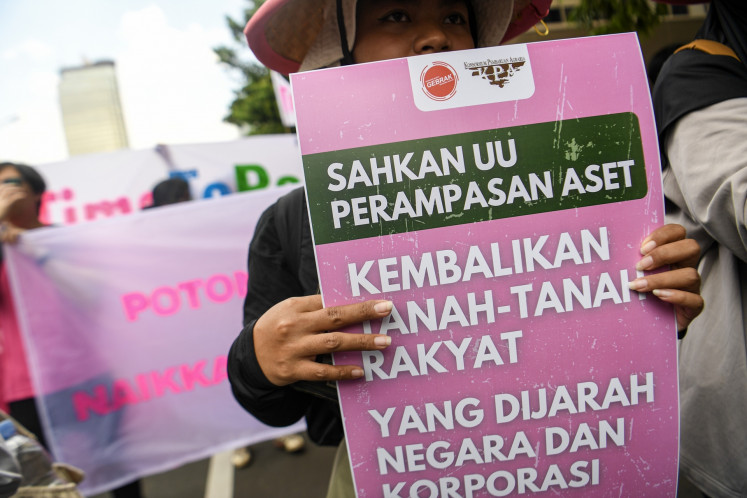Popular Reads
Top Results
Can't find what you're looking for?
View all search resultsPopular Reads
Top Results
Can't find what you're looking for?
View all search resultsDidik Nini Thowok: Dancing is his life
JP/Cynthia WebbAfter a 35-year career as a professional dancer, 57-year-old Didik Nini Thowok is still a force to be reckoned with
Change text size
Gift Premium Articles
to Anyone
J
span class="caption" style="width: 398px;">JP/Cynthia WebbAfter a 35-year career as a professional dancer, 57-year-old Didik Nini Thowok is still a force to be reckoned with.
Frank Sinatra’s “I Did it My Way” could even be his theme song.
Didik has made cross-gender dance his specialty — in his own performances, in his choreography and through intensive study of the subject since 1990.
In 2004, his book on the subject, Cross Gender, was published by Sava Media.
His autobiography Menari Sampai Lahir Kembali (Dancing to Rebirth) was also published the same year. He hopes to have the book translated into English soon.
Didk’s fiftieth birthday was in 2004, and that same year he adopted a baby boy named Aditya. Aditya’s impoverished parents had been unable to provide for him and he is now growing up in an atmosphere of love and sufficiency, and is also privileged to be exposed to the art of dance. He has an affectionate extended family comprised of Didik’s staff.
Didik grew up in Temanggung, and began dancing at the age of 12. He was attracted to the dances usually performed by women and the beautiful costumes that went with them.
Some people in the village thought it was cute and funny, but others looked at him disapprovingly.
“In the beginning, I was so shy and sad because people were looking at me sideways and thinking that it was a silly thing, and saying I was a waria [transgendered],” he remembered.
However, he overcame the hurt and continued to follow his passion, and in 1974 he entered the Indonesian Academy of Arts in Yogyakarta to study dance, saying he felt “established as a performer” by 1977.
In 1980, he founded his dance school Natya Lakshita, the only dance school in Indonesia that is fully self-supporting, setting a standard of business management that has been taken as an example of how to do things in a recent book on the subject. It is a registered business, pays taxes and receives no financial support from the government or anywhere else.
Natya Lakshita’s dance tutor, Hendrid, recently won a Yogyakarta-wide competition for having the finest methods of teaching young children.
Didik has studied in India and Japan and has created collaborative performances with dancers from those countries, and he has traveled to over thirty countries to perform.
Since the coming of the Internet and YouTube it has become much easier for people overseas to find and view his various types of performance, and they have invited him to perform.
His repertoire covers comedy to classics. He performs old and traditional dances from various sources and uses cross-gender dance within contemporary comedy.
Didik has been invited to create a performance to be enjoyed by the international guests who will come to Gadjah Mada University on October 20th for the Sixth Asia-Pacific Conference on Reproductive and Sexual Health and Rights. The audience will be professionals whose area of expertise relates to intimate health and the well-being of men and women.
Didik’s imagination went into overdrive thinking of all the associations, and he has created a 20 minute program of various dances with fabulous costumes.
He envisioned himself performing as an Ardhanarisvara — a half man, half woman deity from ancient India that can be seen as divided down the middle from head to foot, male on one side, female on the other.
This deity represents the synthesis of male and female energies in the universe — shown as an andro-gynous form of Shiva on the right and his consort Parvati on the left.
Didik has gathered 16 cross-gender dancers — mostly young men who are still dance students — to join in the performance. A medley of music and dance has been created of works from different parts of Indonesia — Bali, Sumatra, Java, Banyuwangi and finally a recollection of India, the origin of some of Indonesia’s culture.
Since Didik Nini Thowok paved the way, it is much easier nowadays for young men who want to explore the world of women’s dance and the clothing and make-up associated with it.
At university they can study the dances usually performed by women, and perhaps they will not have to endure as many taunts as did Didik.
Through his work and study, it is now understood that cross-gender dance is an ancient as well as contemporary tradition that occurs in India, Japan, China, Korea and Indonesia. Even in England during Elizabethan times, male actors played women’s roles.
When Didik began to study as a young man, he saw a book from the time of the seventh sultan of Yogyakarta, which said that in wayang wong all roles were performed by men because in Islam men and women cannot touch each other unless they were married to each other.
He also met an old dancer from the royal palace who spoke of men dancing women’s roles.
One outstanding young 19-year-old dancer from Bandung was teaching Jaipong to the Yogyakarta dancers during their rehearsals.
His name is Sugeng Imam Hartanto, an exquisitely supple young man whose movements were elegant and graceful, and who could one day be the inheritor of Didik’s position as King/Queen (the Ardhanarisvara) of cross-gender dancing in Indonesia.
Didik knows he is so well known as a TV star and comedy performer but perhaps some of his doubters do not understand his abilities in classical dance or his serious commitment to formal and traditional Indonesian dance.
He is also seriously committed to helping people like young dancers and the poor in his community, and he has been trying to use his business to help preserve old folk dances from villages around Yogyakarta that are at risk of dying out.
In spite of some disapproval and criticism from the “dance establishment” about his worth as a serious dancer, Didik Nini Thowok has already become part of Indonesian dance history, and he isn’t even finished yet!










